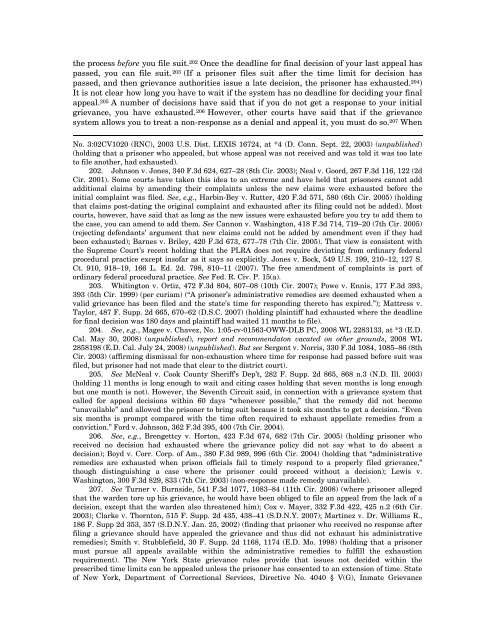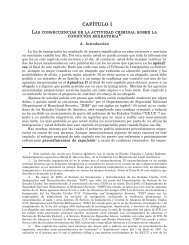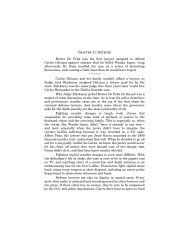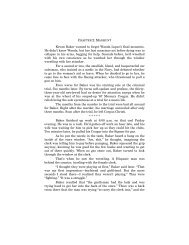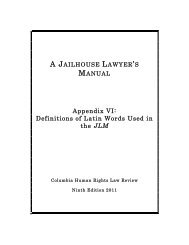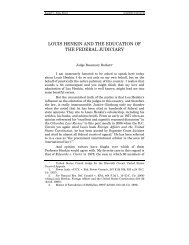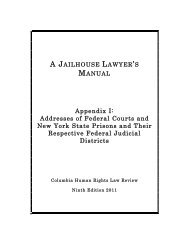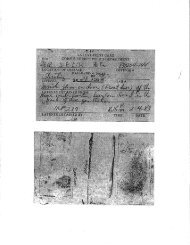A Jailhouse Lawyer's Manual Chapter 14 - Columbia Law School
A Jailhouse Lawyer's Manual Chapter 14 - Columbia Law School
A Jailhouse Lawyer's Manual Chapter 14 - Columbia Law School
Create successful ePaper yourself
Turn your PDF publications into a flip-book with our unique Google optimized e-Paper software.
the process before you file suit. 202 Once the deadline for final decision of your last appeal has<br />
passed, you can file suit. 203 (If a prisoner files suit after the time limit for decision has<br />
passed, and then grievance authorities issue a late decision, the prisoner has exhausted. 204 )<br />
It is not clear how long you have to wait if the system has no deadline for deciding your final<br />
appeal. 205 A number of decisions have said that if you do not get a response to your initial<br />
grievance, you have exhausted. 206 However, other courts have said that if the grievance<br />
system allows you to treat a non-response as a denial and appeal it, you must do so. 207 When<br />
No. 3:02CV1020 (RNC), 2003 U.S. Dist. LEXIS 16724, at *4 (D. Conn. Sept. 22, 2003) (unpublished)<br />
(holding that a prisoner who appealed, but whose appeal was not received and was told it was too late<br />
to file another, had exhausted).<br />
202. Johnson v. Jones, 340 F.3d 624, 627–28 (8th Cir. 2003); Neal v. Goord, 267 F.3d 116, 122 (2d<br />
Cir. 2001). Some courts have taken this idea to an extreme and have held that prisoners cannot add<br />
additional claims by amending their complaints unless the new claims were exhausted before the<br />
initial complaint was filed. See, e.g., Harbin-Bey v. Rutter, 420 F.3d 571, 580 (6th Cir. 2005) (holding<br />
that claims post-dating the original complaint and exhausted after its filing could not be added). Most<br />
courts, however, have said that as long as the new issues were exhausted before you try to add them to<br />
the case, you can amend to add them. See Cannon v. Washington, 418 F.3d 7<strong>14</strong>, 719–20 (7th Cir. 2005)<br />
(rejecting defendants’ argument that new claims could not be added by amendment even if they had<br />
been exhausted); Barnes v. Briley, 420 F.3d 673, 677–78 (7th Cir. 2005). That view is consistent with<br />
the Supreme Court’s recent holding that the PLRA does not require deviating from ordinary federal<br />
procedural practice except insofar as it says so explicitly. Jones v. Bock, 549 U.S. 199, 210–12, 127 S.<br />
Ct. 910, 918–19, 166 L. Ed. 2d. 798, 810–11 (2007). The free amendment of complaints is part of<br />
ordinary federal procedural practice. See Fed. R. Civ. P. 15(a).<br />
203. Whitington v. Ortiz, 472 F.3d 804, 807–08 (10th Cir. 2007); Powe v. Ennis, 177 F.3d 393,<br />
393 (5th Cir. 1999) (per curiam) (“A prisoner’s administrative remedies are deemed exhausted when a<br />
valid grievance has been filed and the state’s time for responding thereto has expired.”); Mattress v.<br />
Taylor, 487 F. Supp. 2d 665, 670–62 (D.S.C. 2007) (holding plaintiff had exhausted where the deadline<br />
for final decision was 180 days and plaintiff had waited 11 months to file).<br />
204. See, e.g., Magee v. Chavez, No. 1:05-cv-01563-OWW-DLB PC, 2008 WL 2283133, at *3 (E.D.<br />
Cal. May 30, 2008) (unpublished), report and recommendaton vacated on other grounds, 2008 WL<br />
2858198 (E.D. Cal. July 24, 2008) (unpublished). But see Sergent v. Norris, 330 F.3d 1084, 1085–86 (8th<br />
Cir. 2003) (affirming dismissal for non-exhaustion where time for response had passed before suit was<br />
filed, but prisoner had not made that clear to the district court).<br />
205. See McNeal v. Cook County Sheriff’s Dep’t, 282 F. Supp. 2d 865, 868 n.3 (N.D. Ill. 2003)<br />
(holding 11 months is long enough to wait and citing cases holding that seven months is long enough<br />
but one month is not). However, the Seventh Circuit said, in connection with a grievance system that<br />
called for appeal decisions within 60 days “whenever possible,” that the remedy did not become<br />
“unavailable” and allowed the prisoner to bring suit because it took six months to get a decision. “Even<br />
six months is prompt compared with the time often required to exhaust appellate remedies from a<br />
conviction.” Ford v. Johnson, 362 F.3d 395, 400 (7th Cir. 2004).<br />
206. See, e.g., Brengettcy v. Horton, 423 F.3d 674, 682 (7th Cir. 2005) (holding prisoner who<br />
received no decision had exhausted where the grievance policy did not say what to do absent a<br />
decision); Boyd v. Corr. Corp. of Am., 380 F.3d 989, 996 (6th Cir. 2004) (holding that “administrative<br />
remedies are exhausted when prison officials fail to timely respond to a properly filed grievance,”<br />
though distinguishing a case where the prisoner could proceed without a decision); Lewis v.<br />
Washington, 300 F.3d 829, 833 (7th Cir. 2003) (non-response made remedy unavailable).<br />
207. See Turner v. Burnside, 541 F.3d 1077, 1083–84 (11th Cir. 2008) (where prisoner alleged<br />
that the warden tore up his grievance, he would have been obliged to file an appeal from the lack of a<br />
decision, except that the warden also threatened him); Cox v. Mayer, 332 F.3d 422, 425 n.2 (6th Cir.<br />
2003); Clarke v. Thornton, 515 F. Supp. 2d 435, 438–41 (S.D.N.Y. 2007); Martinez v. Dr. Williams R.,<br />
186 F. Supp 2d 353, 357 (S.D.N.Y. Jan. 25, 2002) (finding that prisoner who received no response after<br />
filing a grievance should have appealed the grievance and thus did not exhaust his administrative<br />
remedies); Smith v. Stubblefield, 30 F. Supp. 2d 1168, 1174 (E.D. Mo. 1998) (holding that a prisoner<br />
must pursue all appeals available within the administrative remedies to fulfill the exhaustion<br />
requirement). The New York State grievance rules provide that issues not decided within the<br />
prescribed time limits can be appealed unless the prisoner has consented to an extension of time. State<br />
of New York, Department of Correctional Services, Directive No. 4040 § V(G), Inmate Grievance


